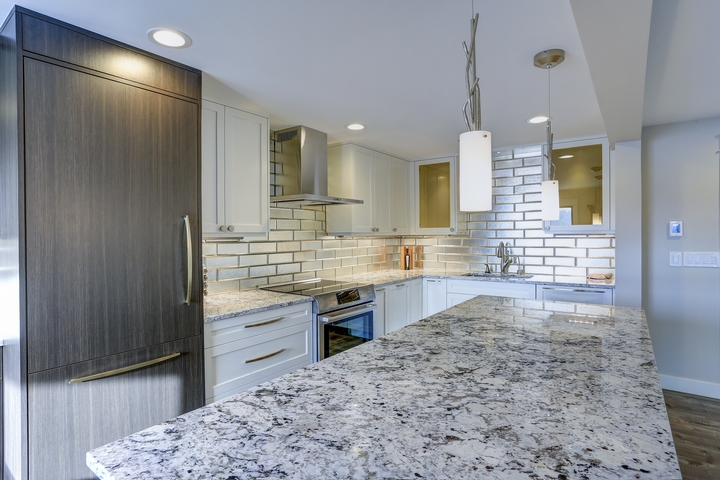One of the most popular debates when it comes to choosing countertops is whether to use granite or Quartz. Some people swear by granite, whereas some incline towards Quartz. Despite which countertop you prefer, there are certain things about both of them that you should know to make an informed decision.
Granite countertops are more durable than Quartz: The first difference between granite and quartz countertops is that granite countertops are more durable than quartz countertops. Granite can last up to 30 years, whereas Quartz only lasts around 15-20 years, depending on how often it’s used.
Quartz is less heat resistant than granite: Another difference is that quartz countertops are less heat resistant than granite. Granite can withstand a temperature range of 100-800 degrees Fahrenheit, whereas Quartz only can manage temperatures up until 700 degrees Fahrenheit.
Granite requires more maintenance than Quartz: The third difference is that granite requires more maintenance than Quartz. Granite must be sealed regularly to prevent stains from penetrating the surface, whereas a quartz countertop does not need sealing. And since granite countertops have a longer life span than Quartz, it also requires more maintenance.
Quartz can chip and crack easily: Another difference between these two countertops is that Quartz can chip or crack if it’s subjected to heavyweights being dropped on top of them. In contrast, granite cannot be chipped as quickly since they are very hard stones compared to Quartz which is relatively softer in nature.
Quartz offers unique designs: Another aspect that may influence which type you choose is whether the design appeals most aesthetically to your taste. Quartz offers more design options than granite does because it can be customized with any pattern or color you wish for.
Granite countertops are slightly less expensive: The final point is that although both types of countertop come at a price tag, they vary widely in costs depending on where you’re located and the specific variation chosen. Generally speaking, though, Quartz tends to cost around $15-30 per square foot, while granite costs approximately $20-40 per square foot (not including installation).

Granite chips can be easily repaired: Although it’s extremely rare to chip either material, the one exception is granite because it can be easily repaired. Quartz chips are not as easy to correct in case of an accident, so this should be considered when choosing between these two countertop materials.
Granite requires professional installation: One final point, which may or may not be a deal-breaker depending on your circumstances, is that if you want quartz countertops installed professionally, they will cost more than installing granite yourself would. If money isn’t an issue for you, then having professionals install the stone shouldn’t have any bearing on your decision. If quality and time aren’t factors that matter most, then doing it yourself won’t make much difference.
Granite is more environmentally friendly: Although this isn’t a significant factor, it is worth mentioning that granite has been more environmentally friendly than Quartz. This is because the production of making quartz countertops releases around 20 times as much CO² into the atmosphere compared to what’s released during its formation, which can help with green initiatives and reducing your carbon footprint on the earth.
Granite looks better: In terms of aesthetics, there are certain things about granite, such as how each type has unique patterns and colors that make them stand out aesthetically from one another, whereas Quartz tends towards being monochromatic or neutral in color, so they blend easier if you want variety but don’t have any specific color preference for your counters. So overall, it’s a matter of personal preference in terms of what type is more appealing.
Granite is less porous: Quartz countertops have tiny pores, which can be hard to clean when food gets stuck inside, whereas granite is less porous. So, it’s easier for grime and bacteria to get removed from the surface with regular cleaning rather than having bits of leftover food left behind that don’t come off as quickly because they’re trapped within the stone itself.
Quartz requires sealing: A final point we’ll cover here is that quartz counters require special cleaners and polishing agents during their lifetime; otherwise, they become damaged and stained too easily. Granite doesn’t need any additional maintenance after installation besides normal household cleaning.
To summarize, granite is a more durable countertop material that’s less expensive. It comes in a wide variety of colors, whereas Quartz tends to be a bit pricier but offers the ability to customize with any pattern or color you want for your counters. On top of that, although both materials require some amount of care throughout their lifetime once appropriately installed, Quartz needs regular sealing while granite doesn’t need anything beyond basic household cleaning. So ultimately, it comes down to personal preference and what features are most important such as cost vs. design options, when choosing between these two types of stone countertops.






